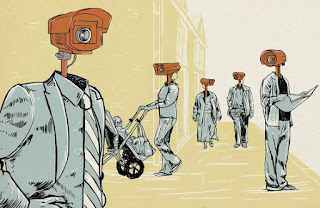When you are young, you feel invincible. Almost all teenagers have said the phrase "that will never happen to me." You hear stories that you think won't happen to you on the news. When something happens to someone, you know the possibility of it happening to you gets greater. That is how I feel about online tracking. Most people know the basics, the government can track your location, everything posted on the internet is never deleted, and apps like Facebook have a high-tech face recognition system. But if you do a little research and discover how much control you don't have about your own information, what you find is scary, and the reality is so much more imminent. I did not think access to our private information is as easily accessible to our government and private companies, police, and foreign governments.
Technology is a fine line, and it can have both positive and negative effects. Whoever is in charge and decides how it is used can determine the outcome. It was created with good intentions but has become one of the most lucrative businesses. Corporations now mainly focus more on how they can make more money rather than what is morally ethical. Catherine Crump explains different technology devices like the Stingray in her TedX talk. She explains that the Stingray is a device that can send out tracking signals inside people's homes to identify what phones are there. This device is used by the police. Police inconspicuously also use other devices that track our information.
Automated License Plate Readers (ALPRs) capture cars around the country. They are on street poles, streetlights, highway overpasses, and on police cars. Because the cost of data storage has drastically gone down, they keep the records of everyone in case they need it in the future. In the video, Crump uses an example of a police car catching an image of a man in his own driveway with his two kids. We have no privacy on our own private property and no say in what the police can do with this information about our whereabouts. This technology is both helpful and harmful. It can help find missing people or identify someone who is wanted. But it can also be more damaging., in New York, police drove around Muslim neighborhoods to capture those who entered mosques. The idea of, out of sight out of mind, is used to our disadvantage when tracking us.
I believe people in my generation have a huge disadvantage regarding our digital footprint. Unlike older generations, where the internet and social media became popular when they were older, we have had access to the online world for almost our entire life. As you grow, you mature; you make mistakes and learn from them. If you never make any mistakes, you never learn any important life lessons. The human brain isn't fully developed until the age of 25. Your online digital footprint never goes away. People who have been a part of the online community since they were kids most likely have given all, if not most, of their personal information online. As Juan Enriquez states in his TEDx talk, our online life is our electronic tattoo. Face.com was an online database that held 18 billion faces; it was sold to Facebook in 2012. With our private info in the hands of private corporations, it can feel like we don't have any control of our own lives.
Some private companies who make the technology we use on a daily basis have put in encryption technology that makes surveillance more difficult. According to Christopher Soghoian, companies like Apple and WhatsApp have made it difficult for outsiders to wiretap their tech. While that can provide some comfort to your own privacy, both private companies can choose to turn off the encryption technology without telling us. Technology and the internet have become embedded in our lives, and there is no going back and undoing its impact. However, we can change how it is created, monitored, and used so that there is 100% transparency. I think private companies and the government should be honest about how they are using technology to gather information about people and, in the future, be more honest about new advancements.

Comments
Post a Comment